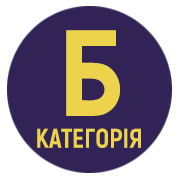FORMATION OF THE CULTURE OF WRITTEN COMMUNICATION AMONG YOUNGER SCHOOLCHILDREN
DOI:
https://doi.org/10.32782/ped-uzhnu/2024-3-13Keywords:
primary school, Ukrainian language, written communication, methods and techniques, spelling competence.Abstract
The article focuses attention on the formation of the culture of written communication, which is a topical issue nowadays. One of the key competences defined by the legislation of Ukraine is the ability of an individual to master the state language. The approaches of scientists to the formulation of the concept of «speech culture» were analyzed, and certain disorders of the written speech of younger schoolchildren were characterized. The purpose of the article is to outline the ways of forming the culture of written communication in Ukrainian language lessons for primary school students. The professional experience of the author, observation of the activities of teachers made it possible to single out the following areas of work: mastering the graphic system of the Ukrainian language at the adaptation-game stage (grades 1–2); formation of spelling and punctuation skills; definition of a system of exercises and tasks aimed at mastering written communication throughout the course «Ukrainian language and reading». The majority of errors made by younger schoolchildren are observed under the influence of the specifics of oral Ukrainian speech (orphoepy), unformed spelling skills. It is emphasized that the formation of spelling skills is a long-term process and goes through several stages: the development of phonetic and graphic skills, mastering the graphic system of the Ukrainian language (1st grade), mastering the rules and recognition of spelling, the ability to apply it and transfer it to other similar examples, automation of acquired skills. Priority is given to the application of a system of training exercises and tasks (writing down, educational dictations, orthographic analysis, work with dictionaries). According to the author, the following methods contribute to the successful learning of spelling rules: traditional: explanatory and illustrative, heuristic conversation, induction, deduction, practical exercises and others; innovative: research, observation of the language phenomenon, cubing, «microphone», making an intelligence map, algorithmization and others. Among the methods appropriate are: imitation, demonstration of articulation, analysis, synthesis, comparison, generalization. Taking into account the concept of the New Ukrainian School regarding the comprehensive education of schoolchildren, attention is focused on the formation of speech and text competence. A specific example shows complex work on the text.
References
Вашуленко М.С. Нова українська школа: методика навчання інтегрованого курсу «Українська мова» у 1–2 класах закладів загальної середньої освіти на засадах компетентнісного підходу: навч.-метод. посіб. К.: Видавничий дім «Освіта», 2019.192 с.
Закон України. Про освіту. URL: https://zakon.rada.gov.ua/laws/show/2145-19#Text
Пентилюк М. І. Культура мови і стилістика. К. : Вежа, 1994. 230 с.
Прищепа О. Ю. Формування і розвиток навичок письма молодших школярів на засадах диференційованого підходу: методичний посібник. Київ: КОНВІ ПРІНТ, 2020. 72 с.
Руденко Л. В. Порушення писемного мовлення у дітей молодшого шкільного віку: сучасний погляд. Вісник Сковородинівської академії молодих учених [Електронне видання] : зб. наук. пр. / Харків. нац. пед. ун-т ім. Г. С. Сковороди ; [редкол.: Ю. Д. Бойчук (голов. ред.) та ін.]. Харків, 2021. С. 315–320.
Чупріна О. В. Методи розвитку зв’язного мовлення на уроках української мови в початковій школі. Науковий вісник Мукачівського державного університету: серія «Педагогіка та психологія» Випуск 2 (8)’ 2018. С. 170–173.
Шевчук С. В., Клименко І.В. Українська мова за професійним спрямуванням : Підручник. 2-ге вид., виправ і доповнен. К.: Алерта, 2011. 696 с.







